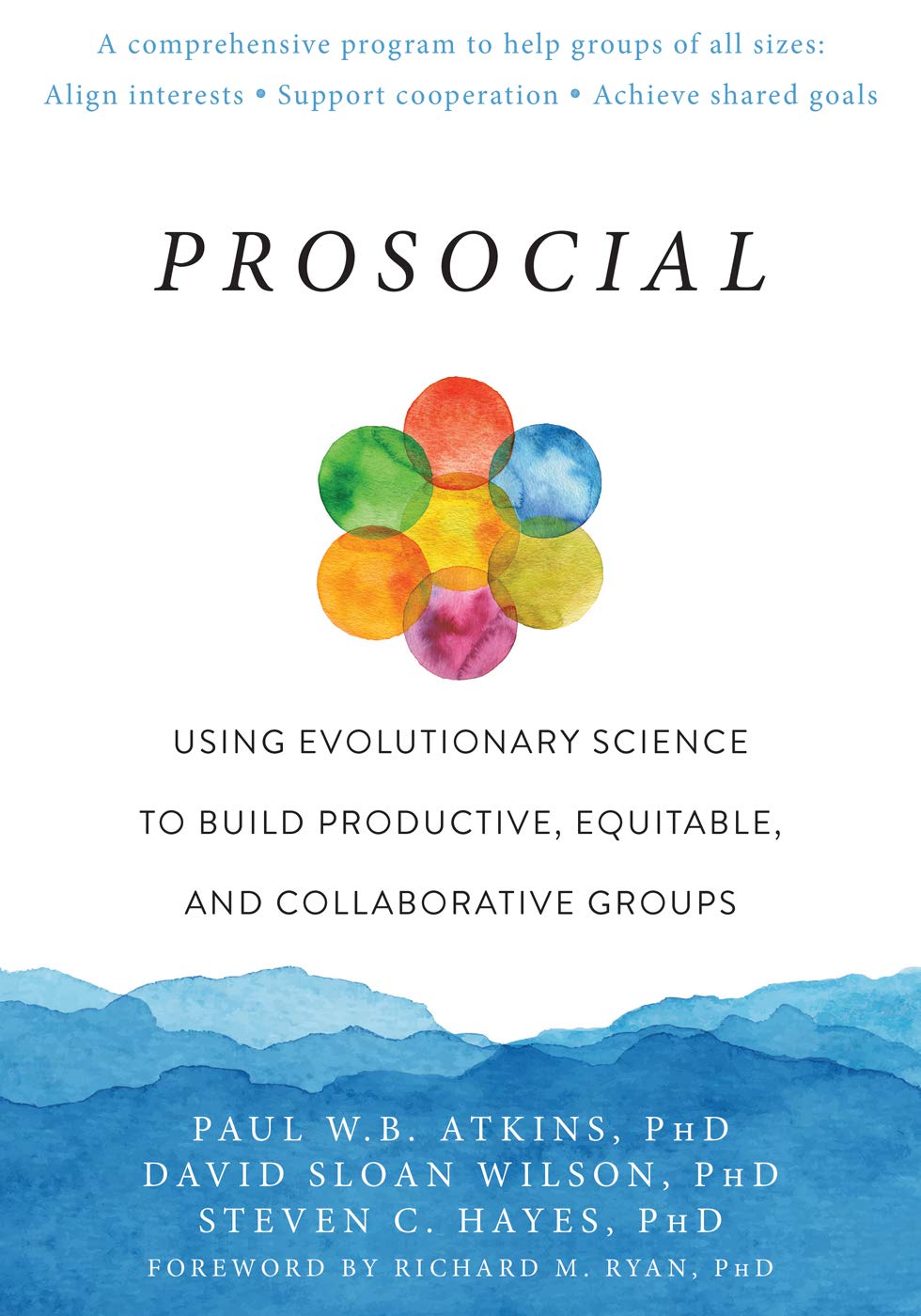
7/21 — Book Review: Prosocial: Using Evolutionary Science to Build Productive, Equitable, and Collaborative Groups
Kaltheen Walsh
Kathleen Walsh, MA

Prosocial: Using Evolutionary Science to Build Productive, Equitable, and Collaborative Groups is a content-rich, yet very readable, module-based presentation of whole system design principles and how to apply them to enhance group functioning. Straightforward and comprehensive, the guidance it can offer intentional communities, locally-based business networks, and grassroots action efforts is a welcome source of clarity and support.
“Prosocial” is, at the broadest level, an umbrella term that describes an emerging global movement to elevate the functioning of groups at all levels and scale so that individual members can achieve their mutual goals in cooperative, efficient processes and groups can more effectively collaborate within networks, or nested hierarchies.
Prosocial practice includes theoretical and research development and social technology tools to assist group members to better understand what they need to do to feel good about their individual role and the how to best enhance whole group functioning.
The conceptual framework developed by Atkins, Wilson and Hayes builds upon the research conclusions of Elinor Ostrom, the only woman awarded the Nobel Prize in economics, which refute the conventional assumptions derived from Garrett Hardin’s “the tragedy of the commons” formulation.
Hardin asserted that when self-organized individuals or groups have access to commonly-held resources, like the grazing fields of old, fish stocks or forests, they will inevitably destroy them. His conclusions have been used historically to justify top-down regulation, centralized control and “trickle-down” economic practices.
Ostrom’s work identified the qualities of effective, cooperative groups that self-organize at the local level to protect collective resources and achieve outcomes they value.
Atkins et al have enlarged Ostrom’s findings to define the essential qualities of effective, self-organized groups at multiple levels and scales. Based on her work, the Core Design Principles they have developed are:
1. Shared identity and purpose
2. Equitable distribution of contributions and benefits
3. Fair and inclusive decision-making
4. Monitoring agreed-upon behaviors
5. Graduated responding to helpful and unhelpful behaviors
6. Fast and fair conflict resolution
7. Authority to self-govern
8. Collaborative relations with other groups
Ostrom’s advanced degrees were in political science and her initial academic focus was on community policing. It was her recognition that indigenous groups have successfully managed shared natural resource commons without external regulation for untold millennium that led to her radical intellectual insights. Groundbreaking in their implications, she conducted rigorous research, primarily based on case-studies, to support her theory. Her work was not well-received during much of her academic career and she is still relatively unknown.
When the Nobel Prize celebrated and publicized Ostrom’s conclusions in 2009, David Sloan Wilson had already co-founded The Evolution Institute and was a sought-after lecturer on multilevel selection theory, which envisions natural selection operating on a multi-tier hierarchy of units, especially with respect to human cultural evolution.
Wilson immediately recognized how Ostrom’s design principle approach dovetailed with multilevel selection theory as aspect of evolutionary transitions, which posits that members of groups can become so cooperative that the group itself becomes a higher-level organism in its own right. This advantage—that of being a higher-level collective organism–informs the evolutionary advancement of more cooperative groups over those that may contain highly effective individuals, but do not function as successfully as a collective with other groups.
The application of the scientific verification of the evolutionary advantage of more cooperative groups to economic and social system design has exciting implications for envisioning and achieving a positive future for humanity. Currently, a global pandemic, disruptive climate change, increasing waves of population migration linked to widening economic disparities and related social tensions signal the limits of domination, competition and separation as primary design principles for effective international governance. It is becoming clear that commerce, resource management, urban planning, social and physical health security require integrated and consistently enforced agreements across global systems in order to address intense, emerging ecological and social breakdowns.
Cooperation can provide signposts and success markers that can guide us on our way. It starts at the ground level and filters upward, through communities, cities, and nations, to reshape the story of humanity’s evolutionary advance.
Paul Atkins, an Australian organizational psychologist, Stephen Hayes, the originator of and pioneering researcher into Acceptance and Commitment Therapy, and David Wilson have developed Ostrom’s original design principles into a blueprint for regenerative culture at the level of groups at all scales, from a single family to international trade partners.
Prosocial builds upon a “power with”, not “power over” relationship model by integrating the importance of enhancing individual “psychological flexibility” skills honed by the use of vital “noticing” tools derived from Acceptance and Commitment Therapy, which they term “ACT Matrices” (visual fields that help organize acceptance and commitment goals). The use of ACT Matrices, which integrates mindfulness practice traditions, are then applied to the consideration of the Core Design Principles.
Elegant and pithy, yet substantive and comprehensive, the core design principles are relevant to locally-based political action efforts, intentional communities, businesses and municipalities. The key is to apply the principles at the appropriate level and to consider them within a whole systems perspective.
Use of the Prosocial ACT matrices offers deeper understanding of members’ experiences of themselves, their group relationships and common goals. Combined with subjectively-based assessments that capture the degree to which the core design principles are realized in their work, members are empowered with an enlarged awareness of defined functional deficits or structural gaps. This awareness leads, in turn, to the recognition of specific action steps that can strengthen their group’s overall functioning and the quality of their relationships with one another.
Polycentric or nested hierarchies of groups, like intentional communities or environmental action movements that use sociocracy or holocracy, can apply the core design principles across networked, or linked functioning both within and between groups.
By integrating self-awareness skills and assessment tools within a proven theoretical framework that captures qualitative dimensions of group interactions, Atkins et al have created what they call “The Prosocial ARC”, a process in which purpose is a function of three levels: Awareness of the personal interior; Relationship quality and the Culture created by using the design principles. Although the text presents the principles in a linear fashion, from 1 to 8, the authors take care to emphasize the primacy of the facilitator’s immediate understanding of the group’s needs to generate systemic, not prescriptive, use of the tools that are appropriate to the context.
The potential of the Prosocial ARC to inform the quickening of insight and skill demanded by the current survival challenges humanity faces is linked to the degree to which it actually practiced. This book outlines the first steps in learning how to do this.
Prosocial: Using Evolutionary Science to Build Productive, Equitable, and Collaborative Groups provides a roadmap for the exploration, discovery and understanding of how to strengthen individual group capacity and enhance the vitality and thriving of an interconnected, interdependent whole human organism living in balance within the limits our natural world is making known to us with increasing urgency.
These are exciting ideas, indeed.
About the Author
Kathleen Walsh ~ Kathleen Walsh, MA, is a retired mental health professional living in Portland, Oregon, USA. She was awarded a Diploma in Organizational Psychology by Birkbeck College, the University of London in 2005 and considers empowerment at the local level to take effective action against harmful economic, environmental and social pressures essential for individual and collective physical and emotional well-being. She is member of her local Extinction Rebellion US’s Regenerative Culture Working Group, a role in which she brings the wisdom of the “prosocial” perspective to interpersonal and organizational needs.
